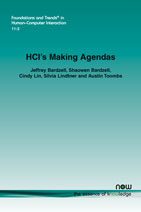HCI’s Making Agendas
By Jeffrey Bardzell, Indiana University School of Informatics, Computing, and Engineering, USA, jbardzel@indiana.edu | Shaowen Bardzell, Indiana University School of Informatics, Computing, and Engineering, USA, selu@indiana.edu | Cindy Lin, University of Michigan, USA, cindylky@umich.edu | Silvia Lindtner, University of Michigan, USA, lindtner@umich.edu | Austin Toombs, Purdue University, USA, toombsa@purdue.edu
Abstract
In this survey, we examine how making emerged as an interdisciplinary arena of scholarship, research and design that connects entrepreneurs, designers, researchers, critical theorists, historians, anthropologists, computer scientists and engineers. HCI is one among many other fields and domains that has declared having a stake in making. And yet, a lot of what and who defines making is happening outside the familiar research laboratory or design studio. We take this article as an opportunity to reflect on HCI’s relationship to making and how this relationship has changed over the last years. Making, we argue, presents HCI with the opportunity to question and revisit underlying principles and long-held aspirations and values of the field. Exactly because HCI and making share some fundamental ideals such as user empowerment and the democratization of participation and technology production, making confronts us with both the potential and the unintended consequences of our own work.
HCI’s Making Agendas
HCI’s Making Agendas examines how making has emerged as an interdisciplinary arena of scholarship, research and design that connects entrepreneurs, designers, researchers, critical theorists, historians, anthropologists, computer scientists and engineers. Human Computer Interaction (HCI) is one among many other fields and domains that has declared having a stake in making. And yet, a lot of what and who defines making is happening outside the familiar research laboratory or design studio. This monograph reflects on HCI’s relationship to making and how this relationship has changed over the last years. Making, it argues, presents HCI with the opportunity to question and revisit underlying principles and long-held aspirations and values of the field. Exactly because HCI and making share some fundamental ideals such as user empowerment and the democratization of participation and technology production, making confronts us with both the potential and the unintended consequences of our own work.
HCI’s Making Agendas is intended to bring readers into maker research and practice, to cultivate their appreciation for making’s many potentials while shining a critical light on cases of over-optimism and even delusion, and to empower you, the reader, to participate in this project of making.